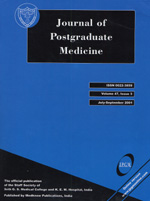
|
Journal of Postgraduate Medicine
Medknow Publications and Staff Society of Seth GS Medical College and KEM Hospital, Mumbai, India
ISSN: 0022-3859
EISSN: 0022-3859
Vol. 54, No. 3, 2008, pp. 191-194
|
 Bioline Code: jp08066
Bioline Code: jp08066
Full paper language: English
Document type: Research Article
Document available free of charge
|
|
|
Journal of Postgraduate Medicine, Vol. 54, No. 3, 2008, pp. 191-194
| en |
A comparative study of the skeletal morphology of the temporo-mandibular joint of children and adults
Meng, F; Liu, Y; Hu, K; Zhao, Y; Kong, L & Zhou, S
Abstract
Background: The skeletal morphology of the temporo-mandibular joint (TMJ) is constantly remodeled.
Aims and Objectives: A comparative study was undertaken to determine and characterize the differences in the skeletal morphology of TMJ of children and adults.
Materials and Methods: The study was conducted on 30 children cadavers and 30 adult volunteers. Parameters that could reflect TMJ skeletal morphology were measured with a new technology combining helical computed tomography (CT) scan with multi-planar reformation (MPR) imaging.
Results: Significant differences between children cadavers and adults were found in the following parameters ( P < 0.05): Condylar axis inclination, smallest area of condylar neck/largest area of condylar process, inclination of anterior slope in inner, middle, and outer one-third of condyle, anteroposterior/mediolateral dimension of condyle, length of anterior slope/posterior slope in inner and middle one-third of condyle, anteroposterior dimension of condyle/glenoid fossa, mediolateral dimension of condyle/glenoid fossa, inclination of anterior slope of glenoid fossa, depth of glenoid fossa, and anteroposterior/mediolateral dimension of glenoid fossa.
Conclusion: There are significant differences of TMJ skeletal morphology between children and adults.
Keywords
Comparison, skeletal morphology, temporo-mandibular joint
|
| |
© Copyright 2008 Journal of Postgraduate Medicine.
Alternative site location: http://www.jpgmonline.com
|
|
